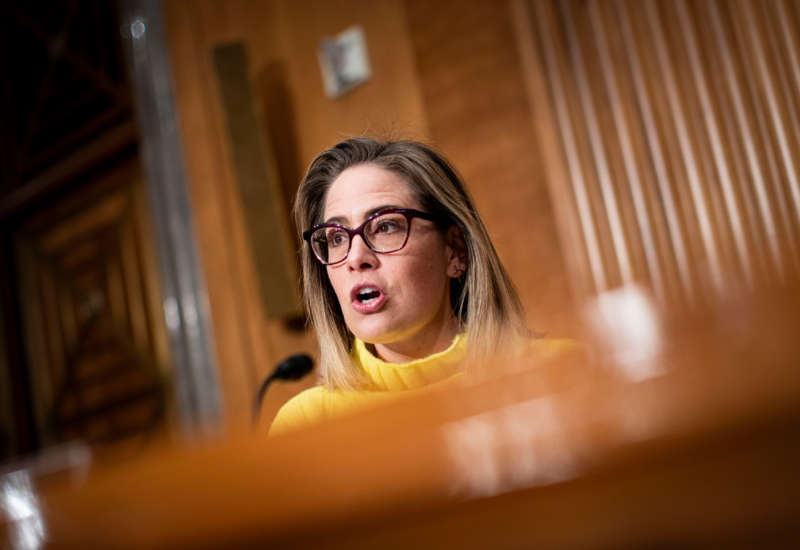Talk of a primary challenge to unseat Sen. Kyrsten Sinema is ramping up in the wake of the Arizona Democrat’s decision to protect the filibuster at the cost of passing voting rights legislation.
Over the weekend, James Carville, one of the doyens of Democratic Party strategy-making, averred that Sinema would lose if she were challenged by Rep. Ruben Gallego, a charismatic ex-Marine who represents Arizona’s 7th Congressional District. CNBC reported that Democratic Party donors were so fed up with the first-term senator that they were now planning to finance a primary run to unseat her.
In 2018, Sinema won a squeaker of an election against Martha McSally. McSally was a particularly weak candidate who struggled to connect with Arizona voters, and who would go on to lose a second Senate race two years later, this time against Mark Kelly. The two victories were crucial to the Democrats in ultimately building a Senate majority.
Yet, during the past few months, Sinema, along with West Virginia Sen. Joe Manchin, has made it all but impossible for the Senate to pass two crucial packages of legislation — the Build Back Better Act, and voting rights protections to counter state-level GOP efforts to constrict the franchise.
Sinema protested Build Back Better’s high price tag, but when push came to shove, she actually seemed more concerned about its efforts to rein in Big Pharma. Where Manchin engaged in constant — albeit ultimately fruitless — negotiations with the White House over reshaping the bill in ways he felt he could get behind, Sinema was more of a cypher. Colleagues in Congress reported they simply didn’t know what she wanted and thus couldn’t really engage in negotiations with her.
As for voting rights legislation, she delivered a spirited defense of the filibuster as a needed guardrail to protect bipartisanship, despite the fact that bipartisanship is largely a dead letter in this Senate, and despite the fact that then-Senate Majority Leader Mitch McConnell rammed through former President Donald Trump’s Supreme Court nominees without any allowance for filibusters against them.
As a result, Sinema has handed veto power to a GOP that is determined to block any and all of President Joe Biden’s legislative agenda for the coming years. She also made it all-but-impossible for federal laws to be enacted to protect voting rights in the face of an onslaught of restrictions being voted into state law around the country.
But progressive anger at Sinema goes beyond her intransigent position on the filibuster. Grassroots activists in Arizona increasingly view Sinema as beholden to big money. Last week the New York Times reported that less than 2 percent of the $1.6 million the senator raised in the fourth quarter of 2021 came from small donations under $200. At least as damning in the eyes of the Democratic grassroots is the fact that large amounts came her way from GOP donors and from conservative PACs, including one affiliated with Fox News.
As Democratic strategist Carville pointed out, this rage has accumulated over the last year, and is now reaching the point where it places Sinema on increasingly shaky political ground. While she has considerable support among Republican and Independent voters in Arizona, even back in September — before she stood in the way of implementing voter protections — fewer than one in five of the state’s Democrats had a very favorable view of her.
That contrasted with her Democratic colleague, Senator Kelly, of whom 42 percent of Arizona Democrats had a very favorable opinion. That same poll showed that four out of ten of the state’s Republican voters looked upon Sinema favorably — which might bode well for her in a general election but won’t help her (and could well hurt her) if she faces a serious challenger in the primaries.
Back in October, a Data for Progress poll found that a slew of candidates, including Representative Gallego, as well as the mayors of Phoenix and of Tucson, would beat Sinema in a head-to-head primary race, and that Gallego would beat her even in a multi-candidate race. There haven’t been similar polls since Sinema’s blockade of the voting rights legislation, but it’s hard to see how that will have improved her standing among Democrats in her home state.
The prospect of a credible primary challenge against Sinema is, in the wake of her actions over the past months, increasingly likely. The newly formed Primary Sinema Project, part of the Change for Arizona 2024 PAC, is raising money to channel to local groups that are laying the groundwork for a primary challenge. Two other PACs, Nuestro and CrowdPAC, are also working on developing viable challengers to the senator, as is the grassroots group LUCHA, which is tapping into an ActBlue fundraising effort to primary the sitting senator.
The blue-ing of Arizona didn’t occur in a vacuum. Sinema and Kelly won their Senate seats, and Biden won the state’s 11 Electoral College votes, at the back-end of years of organizing by unions, by immigrants’ rights activists, by racial justice organizers, by progressive groups like Indivisible, and others. Sinema has, in the past few months, squandered the good will of pretty much all of these groups.
The senator is likely banking on the fact that two years is an eternity in politics, and that, by 2024, all will have long been forgiven and forgotten. She might be right; but it’s equally likely that these organizations, spurned and ignored by the senator they played a critical role in electing, will do everything in their power to replace her when the opportunity presents itself.


